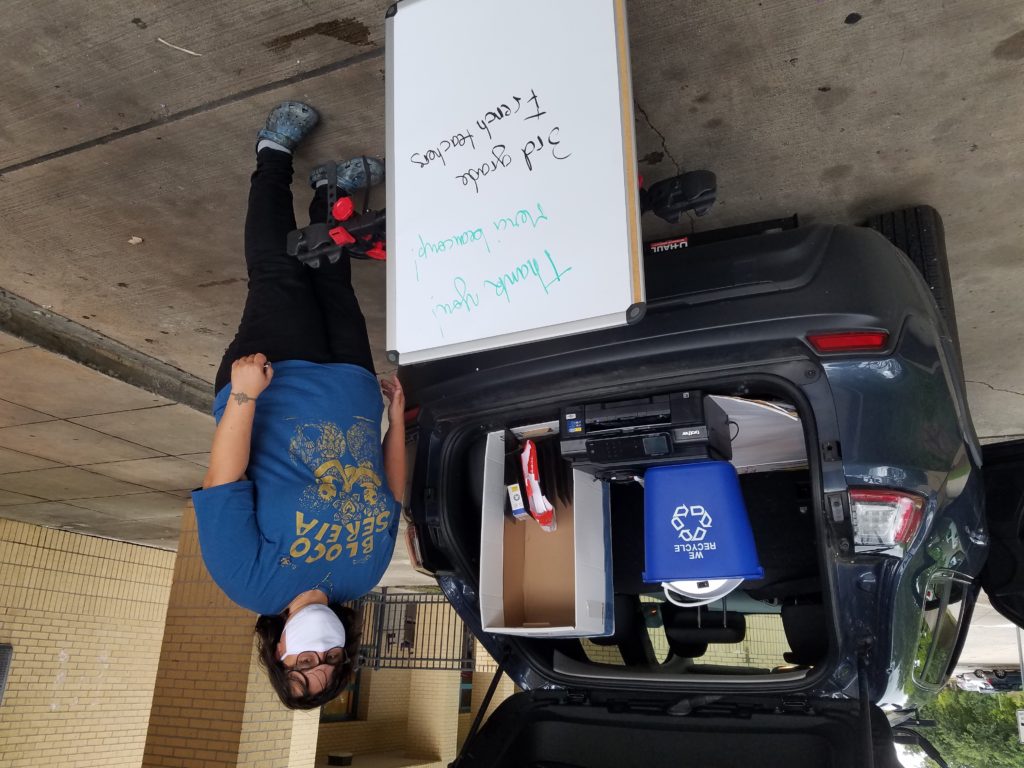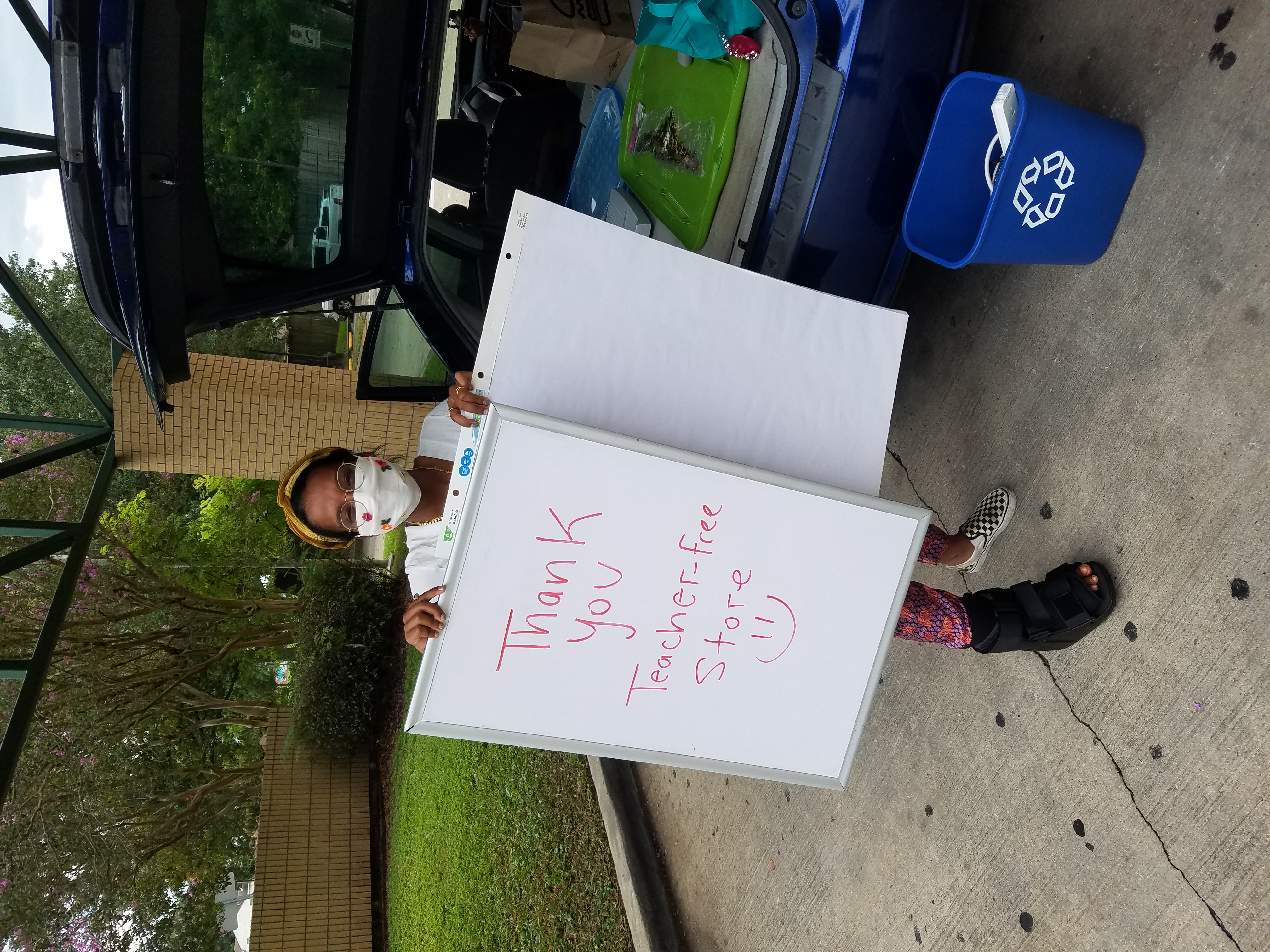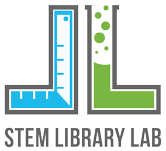For my first ever STEM Library Lab blog post, I want to introduce a phenomenon that we have encountered in a variety of contexts, entwined in our work to combat systemic inequities in New Orleans public schools. STEM Library Lab has a deliberate equity mission; we target our outreach toward schools that are underfunded and serve primarily Free-and-Reduced-Lunch student populations.
But this problem, resourcing the under-resourced, is deceptively challenging. Let me give a concrete example, from our Teacher Free-Store. The Free-Store invites any educator, in-classroom or informal, to stop by and pick out classroom materials such as organizers, office supplies, decorations and more. Since August, we have prioritized virtual classroom/home office materials, and curbside pickup We sent (and are still accepting) invitations for appointments to over 3,000 local educators in the last 2 weeks. Of the respondents, 92% have been from schools with an “A” grade on their SPS score. “A” schools make up less than 10% of all Orleans Parish public schools

Do the teachers at C, D, and F schools just not need free supplies? We know empirically this is not the case, so are forced to ask, what makes those teachers less likely to take advantage of a resource? I would propose three reasons.
- Lower SPS schools have poorer communication. Even if an email from SLL reaches those teachers, it may not be well-internalized. But at high SPS schools, an instructional lead sees the email, and forwards it to her staff, giving all teachers a second at bat, this time coming from a more trusted source. Just like we know with our students, more at bats to see an email means a higher chance of success.
- The teachers at lower SPS schools have more non-academic pulls on their time, and less ready to make the extra effort for one more thing. I know this from my experience, the problem of “One More Thing” which I’ll dive into in a later post, is alive and real.
- This sounds too good to be true, and I don’t want to be duped, so I won’t get my hopes up. There is less inherent trust in many of our lower SPS schools. Statistically, these schools have less experienced faculty, and less experienced administrators, meaning the schools have less cohesion or institutional memory. If you work in a system that has been operating smoothly for years, mentorship and trust opportunities build, and teachers are more free to learn about beneficial resources.
So how do we combat this? I’ll share some thoughts, but the truth is, I don’t know! This is a problem we struggle with daily, “how do we convince under-resourced schools that STEM Library Lab can actually help them?” We see it in the Free-Store, as well as in our Professional Developments and our Equipment Lending Co-op.
Build in systems: If we find too many teachers are arriving from top-scoring schools, make a policy that says “Teachers from A or B rated schools welcome, but you must bring along a teacher from a C or lower rated school.” I believe this can work for a number of demographics. If we find that primarily early 20’s teachers are visiting, or primarily white teachers, or primarily geographic transplants, say to them, “Yes please come, but bring with you someone from X affinity group who may feel less intrinsically motivated to try us out otherwise.” I believe this action has externalities for our community well beyond simply encouraging visitors to the Free-Store.
Be proactive: Just as mentioned with At-Bats above, we need multiple levels of outreach. I am a bad sales person (in part because I am apparently too inclined to give away products for free). But I also care deeply about the mission of SLL, and believe deeply that what we offer is genuinely helping bolster student investment and achievement. And so it is imperative that we keep trying. Sometimes trying the same thing repeatedly, sometimes trying new approaches. But be proactive.
Improve our reputation: STEM Library Lab was started by former teachers, and it was started as grassroots as they come. As a consequence, while we have great impact data and results, we have very little brand presence or reputation. If my friend suggests a new restaurant, I’m more likely to visit (take-out these days) if Ian McNulty also recommends, teachers are more likely to make their first visit if they’ve heard about us in the news or online, even if a colleague is recommending it. SLL has been getting good press – named to Biz New Orleans New and Notables of 2019, WDSU’s Project Community, and most recently Gambit’s 40 Under 40 for 2020. We need to capitalize on this, and use it to make sure we can further our impact mission as effectively as possible.
But I’d love to hear your thoughts! Let us know, do you agree with the reasons why we see a dearth of teachers from low SPS score schools, and with our game plan for how to make the change?

Submit A Comment
Your email address will not be published.


Very insightful post. I appreciate the introspective point of view. I agree with most all of it.
Coming from a non-A school I think it might run a little deeper. We’ve had to be resourceful for so long that it’s difficult to see the value in resources freely given. Also there is often so many turnovers with staff or curriculum that it’s hard to know which end is up. Seasoned teachers that typically stay in A schools, are more comfortable with what and who they are teaching and know exactly what is needed because they’ve done it for so many years.
Imagine, if you will, that teaching in a non-A school is like surviving on a deserted island. We’ve learned to make our own fire using friction, ingenuity, and multiple failures. Then someone offers you matches. While these matches would most certainly make life easier for a little while, they are not a long-term solution for survival on an island that doesn’t grow matches on trees (or at least the potassium chlorate part of the match). So for sake of adaptation, you learn the skills to make do with the resources you have available.
Don’t get me wrong I love what SLL is doing and your proverbial matches look extremely useful. However, I fear that when the going gets tough and there aren’t any matches around I’ll still be rubbing sticks together in the long run.